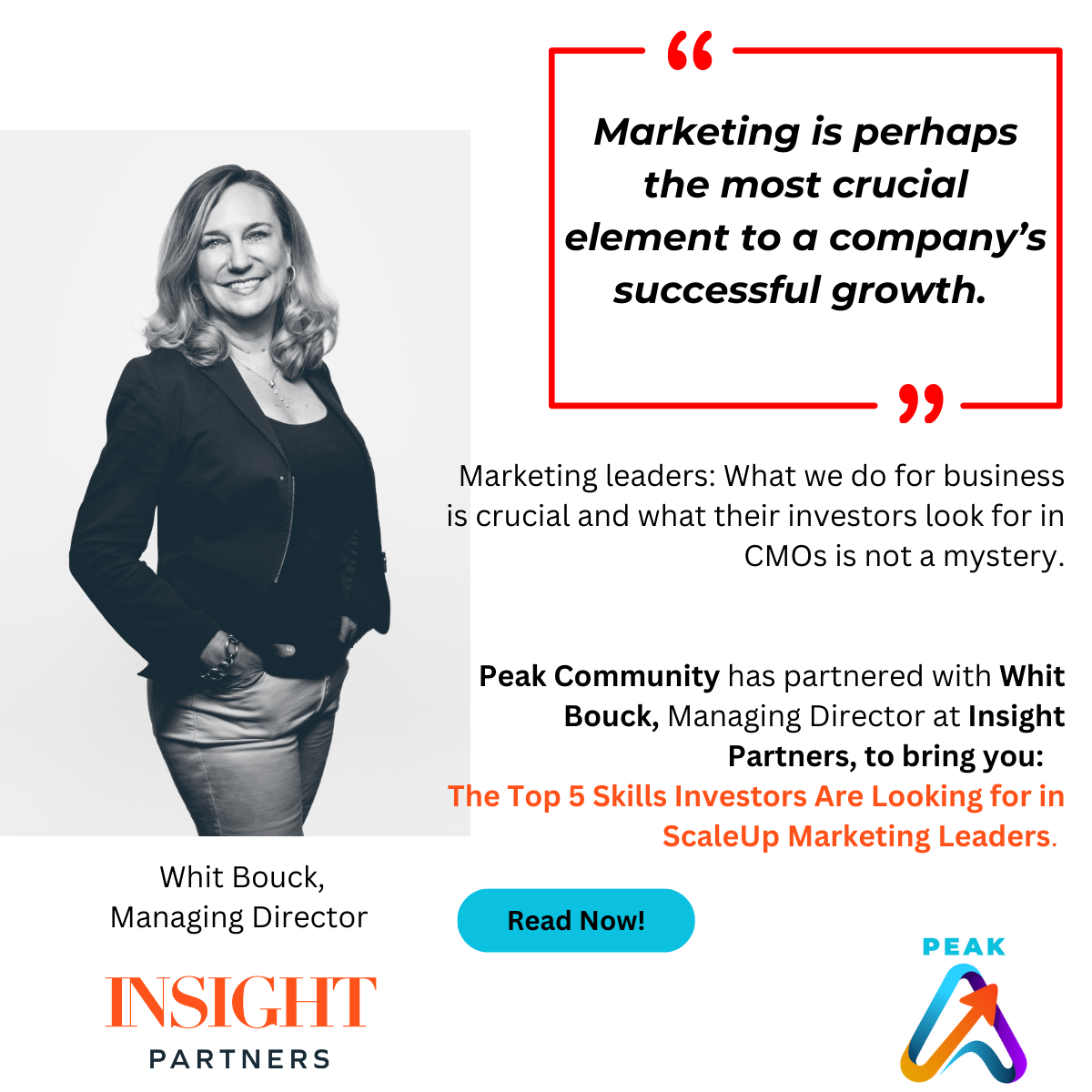August 29, 2024
Marketing is perhaps the most crucial element to a company’s successful growth. At its simplest, marketing is the way in which a company connects a compelling and differentiated product to the very people most interested in buying it. The actualities of marketing are, of course, much more complicated and involve a combination of branding, building awareness among target customers, effectively engaging and building interest in those target customers, and ultimately compelling the customer to buy. Done right, marketing will drive exponential growth for a company. As a former CMO and COO, I know this to be true at all phases of a company’s maturity. I’ve helped build and scale software companies, from startup through IPO (3 times) and acquisition (twice) and have helped dozens of companies through their own ScaleUp journeys. In an early-stage company, marketing will determine the ideal customer and help to establish product-market-fit by building repeatable and efficient programs to acquire those customers. As a company grows, marketing will scale those programs, expand into new channels, and reach new audiences to grow sales. Through my years of operating experience and as a board member and advisor to Insight Partners’ portfolio companies like Writer, Trengo and BlueOcean, I know that the role of CMO is complex and requires close partnership with key internal and external stakeholders. A truly great CMO will: · Help shape the strategy and growth path for the whole company · Establish a leadership position in the market relative to competition · Drive revenue directly through online sales and indirectly by creating pipeline for sales · Contribute to a differentiated product strategy by understanding customers, market dynamics, and competition · Establish leadership with analysts and influencers None of these responsibilities are easy. Therefore, as companies look to raise money from investors, having a best-in-class CMO is crucial. They can instill confidence in an investor that the company is headed in the right direction, can capitalize on the market opportunity, and has potential to be successful as a business, thus giving investors a good return on their investment in the long run. So, what five key skills do investors look for in a CMO? 1. Exceptional Storytelling The ability to craft and communicate a compelling narrative is paramount. Customers are convinced by a value proposition that resonates with them. But investors are not just buying into today’s product or even today’s version of a company; they are buying into the potential of the company. A CMO must be able to tell the company’s story in a way that resonates logically and emotionally with investors and ultimately convinces them of probable success. This necessitates painting a vivid picture of the future, illustrating why the company's product will be well-adopted by the market, and plotting the journey from present-day challenges to future successes. Exceptional storytelling can inspire belief and trust in the company’s trajectory. 2. Deep Market Knowledge Understanding the market inside and out is non-negotiable. A CMO must possess a thorough knowledge of the Total Addressable Market (TAM), Ideal Customer Profile (ICP), and the purchasing behaviors of these potential customers. They need to know the most effective routes to reach those target customers and have a keen awareness of the competitive landscape. This deep market understanding allows the CMO to craft strategies and programs that are both targeted and adaptable, as well as identify new opportunities and channels to grow the business. Having in-depth market knowledge and an aligned marketing strategy means better chances of success and a more attractive bet for investors. 3. Clear Product Differentiation Knowing why your product wins in the market is critical. A CMO must have an unshakeable understanding of why customers choose their product over competitors, and vice versa. This involves identifying the key problems the product solves, articulating a unique value proposition in solving those problems, and highlighting the differentiators that set the product apart in the market. By clearly demonstrating why the product is superior and how it meets customer needs more effectively than alternatives, customers are likely to buy, lending credibility to growth plans and market success. This is the backbone of a compelling case for investment. 4. Mastery of Metrics In the eyes of investors, metrics tell the true story of a company’s performance and potential. A skilled CMO knows which metrics matter at different stages of funding. · Series A: At this stage, investors are looking for early signs of repeatable customer acquisition patterns, a clear understanding of Customer Acquisition Cost (CAC), and evidence of pipeline generation and revenue growth. These metrics together indicate whether the company has found early product-market-fit and can attract customers in a repeatable way. · Series B and beyond: Here, the focus shifts to scaling successful strategies and expanding into new channels and programs for revenue growth. Investors will consider a different set of metrics at this stage, including predictability and repeatability of conversion at every funnel stage, Total Addressable Market (TAM), Gross Retention Rate (GRR), Net Retention Rate (NRR), and the growth rate of Net New Annual Recurring Revenue (NNARR). This collection of metrics together indicates rate of growth, how likely customers are to renew, how likely they are to purchase more, and how much opportunity/growth potential exists. Mastery of these metrics allows the CMO to present a quantifiable and transparent picture of the company’s growth and scalability, which is crucial in building investor confidence. 5. Navigating AI’s Risks and Opportunities In today’s technological landscape, understanding AI's implications is crucial. Investors are keenly interested in how AI can be leveraged for marketing success and for optimal efficiency. Ideally, a marketing team today can drive far more growth with the same budget they might have spent years ago by leveraging AI tools and technology. A CMO must be knowledgeable about the most impactful AI products for their marketing team and be able to demonstrate tangible results. This includes understanding AI's potential to maximize marketing efforts, enhance customer engagement, and drive data-driven decision-making, as well as being aware of the risks and ethical considerations associated with AI. A ScaleUp company seeking investment is best served by having a marketing leader who can excel in storytelling, possesses deep market knowledge, can clearly differentiate the company’s product(s), is a master of key metrics, and can leverage the potential of AI. These skills not only showcase the CMO’s ability to drive growth but also instill confidence in the company's long-term scalability and success, making the company a more attractive and safer investment. Do you want to learn more about what investors are looking for from marketing leaders or to connect with a community focused on getting you that and much more? Join Peak Community now!



